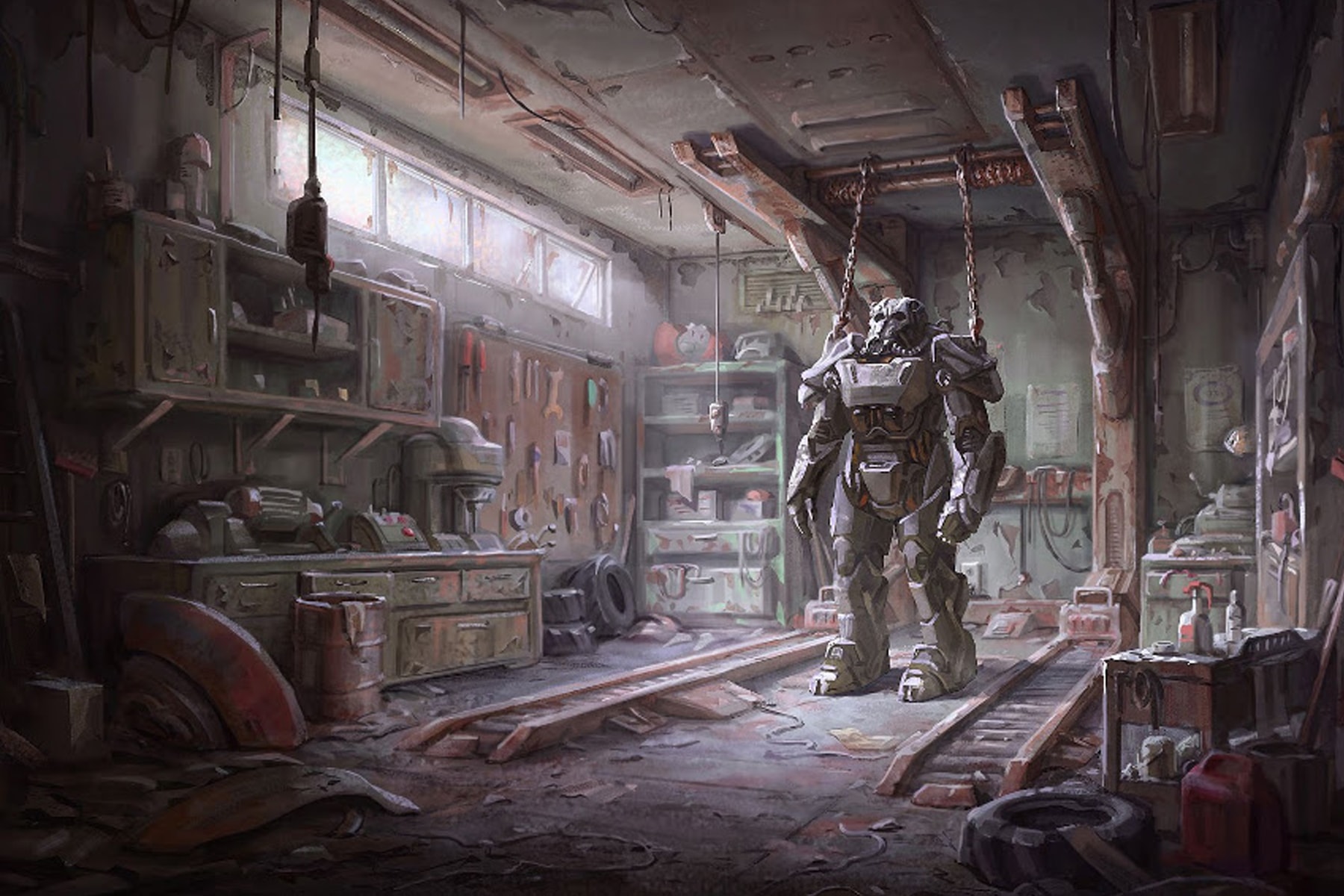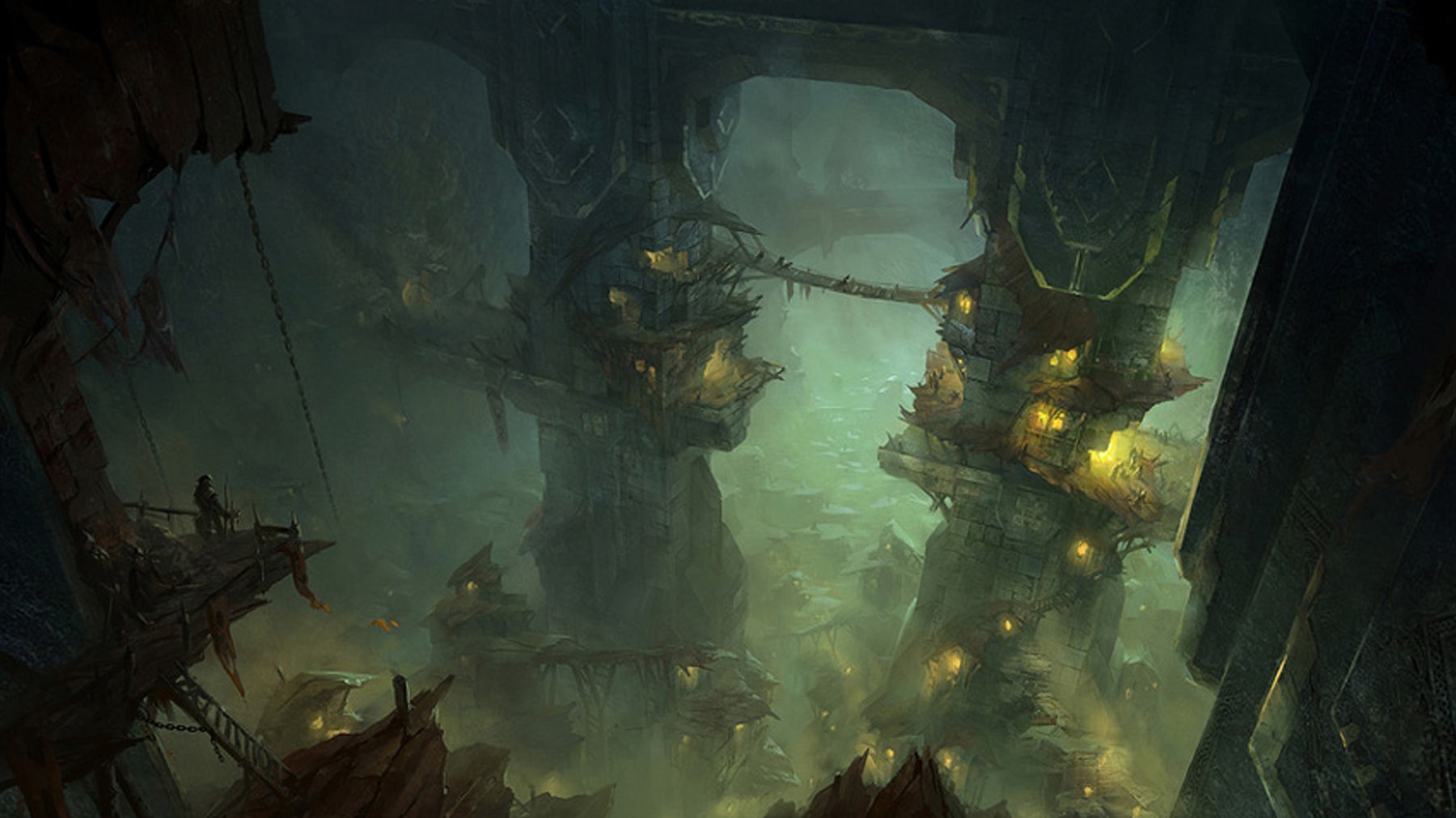DigiPen graduate Ilya Nazarov (2004) works as a concept artist at Bethesda Game Studios, where he most recently helped portray the post-apocalyptic wastelands of Fallout 4 through his evocative paintings and sketches.
Prior to that, he worked at Warner Bros. and Retro Studios on titles in the Lord of the Rings and Metroid game franchises.
We reached out to Ilya by email to ask him about what it was like to work on such a massive and high-profile project, and what it means to be a professional concept artist.
He also shared his memories of how a twist of fate brought him halfway around the world from his childhood home in Russia to DigiPen Institute of Technology in Redmond, Washington, where he went on to obtain his Associate of Applied Arts degree (precursor to the BFA in Digital Art and Animation) before embarking on his dream career.
Q. How long have you been working as a concept artist? How did you get your start?
I’ve been working as a video game artist since 2004 and as a full-time concept artist since 2008. I got my start with an internship at Retro Studios, which is a division of Nintendo. I was hired there shortly before graduation, along with two other DigiPen students. At Retro I did mostly 3D artwork as well as some concept art. After four years I knew that I wanted to do concept art full-time, so I quit my job and spent a year traveling and working on my concept art portfolio. I landed a concept art job at Warner Bros. in 2009 and have been doing concept art full-time ever since.
Q. For those who might not know, what is the job of the concept artist?
The role of the concept artist varies somewhat from studio to studio. But in general our main responsibility is to rapidly prototype visual ideas. You will usually be expected to work closely with art directors and game designers to help define their vision before production commits much time to it. Nowadays you are often expected to also be competent in illustration to help promote the game and sell game pitches.

Q. What are some of the primary skills that a game concept artist needs to have?
I would say that your primary skills are communication, coming up with original ideas, quick problem solving, and art skills — in that order.
Q. What do you enjoy about working at Bethesda?
Working at Bethesda is awesome. … For the kind of games that we do, we are a surprisingly small development studio, and therefore we get to share a lot of responsibilities and wear lots of hats — and I love that. It is also awesome to have such a large and amazing fan base.
Q. What was your reaction when you found out you would be getting to work on Fallout 4?
I was thrilled! Growing up, my best friend was an avid Fallout 1 and Fallout 2 fan, so I felt a huge sense of responsibility to him and other fans right off the bat. Fallout is a very creative and fun franchise, and it’s awesome to get to work on a project so unique.

Q. What were some of the creative challenges you faced while working on Fallout 4?
I’d say that the main creative challenge was just the pace that we had to work at. Fallout 4 is a huge game with an enormous amount of designs. We have a pretty small concept team. For a large portion of the project it was just [fellow artist] Ray Lederer and me. Adam Adamowicz passed away early in the development and John Gravato joined towards the end.
I’ve always wanted to work in video games. Coincidentally, I was also good at drawing most of my life.”
I’ve never had to work at such a pace before in my career and it has certainly made me a stronger artist.
Q. What have you most enjoyed about your work on the game? Do you have a favorite character, creature, or environment?
You know it’s funny, but I had never actually drawn a gun or a car before I worked on Fallout 4. I’m really proud of how the cars turned out, and it was an awesome learning experience. I’m also fond of the pipe guns. I found these old army videos on YouTube that walk you through the mechanics of ballistic weapons. Those mechanics inspired the pipe guns, and it was fun to tackle something that’s been done so many times before — a rusty post-apocalyptic gun — from a newer, more “function-follows-form” angle.

Q. What was it that made you decide to pursue a career as a video game artist?
I’ve always wanted to work in video games. Coincidentally, I was also good at drawing most of my life. I moved to the U.S. when I was 16 and was riding in the family car in Redmond one day. I saw a sign that said DigiPen and asked my step dad to turn around. Somehow I remembered that years ago, back in Russia, I learned about how the first school dedicated to making video games had opened in America. Lo and behold, there it was, and I had moved across the world to within the 20 miles of it! [At that point] there was no talking me out of it, and trust me, my parents tried!
Q. What do you remember about your time at DigiPen? How did your education help prepare you for becoming a professional game artist?
My time in DigiPen was amazing. In Russia, my class had 16 girls and two guys. DigiPen was pretty much the exact opposite. It was one of the nerdiest, most hardcore experiences of my life, and looking back at it, it was completely incredible. I was surrounded with passionate like-minded students. We all shared similar interests and spend 14-plus hours a day, every day, talking, breathing, and living art and video games. The hopes and enthusiasm that we shared for the industry and the dreams that we dreamed for gaming in general — it felt like I had found a home and a family, and I couldn’t wait to get out into the world and make my mark.
I was 16 and was riding in the family car in Redmond one day. I saw a sign that said DigiPen and asked my step dad to turn around.”
DigiPen helped me focus my passion and get my foot in the door with an internship. The friends that I’ve made have been invaluable, and we have all helped each other in our careers greatly.

Q. What advice do you have for other students who are interested in becoming professional concept artists?
Well, first I have to get what everyone else says out of the way: This field is extremely competitive. There is a much bigger supply of talent than there is demand. With that being said, if you are OK with this and the struggles that may come along the way — go for it!
My advice to you would be to focus on three things: (1) Relentlessly study and practice your foundational art skills. (2) Find your voice — the unique way that you see the world around and inside you, and find an authentic way to express it. (3) Learn how to be a good team player.
Concept art is all about collaboration and being a part of the team.”
Concept art is a bit like writing. Your foundational skills are like mastery of a language to a writer — they make you competent. They are important in landing your first jobs and making a good impression on clients. Most students, naturally, are focused on these. But like with writing, the most important thing in art is ultimately having something to say, as well as having a fresh perspective and new ideas. Therefore it is really both of these things that you ought to focus on. Many artists ignore one or the other. Those that focus on both achieve great things.
Finally, never stop working on your social and communication skills. Concept art is all about collaboration and being a part of the team. Learn to lend your vision and/or your ability to draw to others. Even people who do not have many original ideas flourish and are essential in this industry when they have good art foundation skills and great communication skills. If you can iterate on ideas quickly, not be emotional about the process of elimination, and help give form to other people’s ideas on paper, you will be highly sought after.
The last bit of advice I’d like to give was given to me by my teacher at DigiPen years ago. It was long ago, so I will be heavily paraphrasing. At the time, I was unsure whether to focus on environments or characters and what type of content to put on my portfolio site. He told me not to worry so much about appealing to where the demand lies. Instead, he recommended that I work on that which I feel most passionate about, because that would help me get the best results and attract the employers that appreciate the same things that I did. I think that this is wonderful advice.
Thanks and good luck to you guys!
Be sure to check out more of Ilya’s artwork on his personal website at ilyanazarov.com. His work is also featured in the book The Art of Fallout 4.
